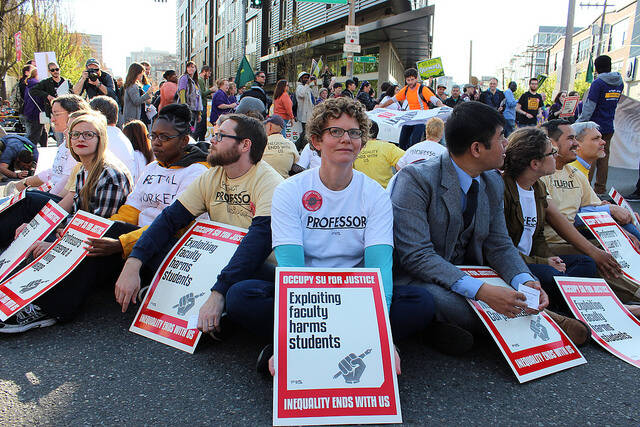As part of protests across the United States for a higher minimum wage yesterday, adjunct professors from Seattle University were among the 21 people arrested in a sit-in that blocked an intersection in the Capitol Hill neighborhood of Seattle. The professors made common cause with the fast-food, retail, and service workers who have been far more visible in the struggles for higher pay, but who rarely have PhDs attached to their name. Does a professor really count as a low-wage worker?
The Service Employees International Union, which is supporting the ongoing union drive among Seattle University’s adjuncts, cites data suggesting that in many cases the answer is yes. According to an SEIU factsheet, part-time faculty members are more likely to be poor than average Americans, with 22 percent of them living below the poverty line. Taxpayers, then, are making up for this lack; a quarter of part-time faculty members’ families are enrolled in public assistance programs. Many are working multiple jobs, academic and otherwise, to get by.
Seattle University, a Jesuit institution, has taken steps to improve pay and conditions for non-tenured professors, though it continues to resist unionization on the basis of religious freedom—a peculiar approach, it would seem, since Catholic teaching affirms the right of workers to organize. Meanwhile, the university publicizes its role in convening discussions about raising rates for hourly workers in Seattle.
While highly educated professionals and low-wage, hourly workers have rarely found common cause in the past, British economist Guy Standing has argued that they increasingly share a common category—what he has called the "precariat." From migrant construction workers in Abu Dhabi to Uber drivers in American cities, these are workers who have diminishing access to not just living wages, but a whole range of benefits normally associated with citizenship.
From large corporations to church-affiliated universities, more and more of the U.S. economy is pivoting toward reliance on part-time and contract workers. Such workers—and I have been one for my entire professional life—are not guaranteed features of the social contract that have typically come through full-time, salaried employment, such as health insurance, a pension, paid sick leave, vacations and predictable hours. There are real differences in social and cultural capital between, say, a laborer in Abu Dhabi and a columnist for America; but we are both experiencing diminishing access to the basic rights that citizenship should afford.
Seattle is one of the few places (along with San Francisco) where the $15 minimum wage is on track to be implemented. But yesterday’s protesters made clear that $15 isn’t enough. Now they’re demanding a living wage—enough to meet basic needs at the local cost of living. How can such a demand still seem so aspirational?
In the context of a swelling precariat, union organizing is about more than hourly wages. As large institutions retreat from their traditional role of providing many basic rudiments of citizenship, workers need their own organizations to ensure their rights are met—whether through government programs or the kinds of mutual-aid networks that preceeded such programs, now being revived through groups like the Freelancers Union. When our citizenship is in question, human dignity demands that we organize to protect it, and that we support others who are doing so.








